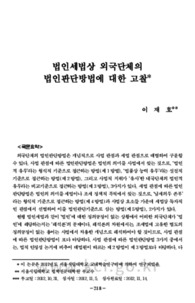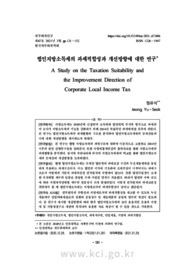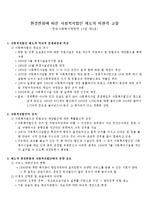

-
미리보기
서지정보
· 발행기관 : 한국세법학회
· 수록지 정보 : 조세법연구 / 18권 / 3호 / 218 ~ 261페이지
· 저자명 : 이재호
초록
외국단체의 법인판단방법은 개념적으로 사법 관점과 세법 관점으로 대별하여 구분할 수 있다. 사법 관점에 따른 법인판단방법은 법인의 의미를 사법에서 찾는 것으로, ‘법인격 유무’라는 형식적 기준으로 접근하는 방법(제1방법), ‘법률상 능력 유무’라는 실질적 기준으로 접근하는 방법(제2방법), 그리고 사법적 지위가 ‘유사’한 내국단체의 법인격 유무라는 비교기준으로 접근하는 방법(제3방법), 3가지가 있다. 세법 관점에 따른 법인 판단방법은 법인의 의미를 세법이나 조세 정책적 목적에서 찾는 것으로, ‘납세의무 존부’라는 형식적 기준으로 접근하는 방법(제4방법)과 사법상 요소들 가운데 세법상 독자적인 관점에서 선별하여 이를 법인판단기준으로 삼는 방법(제5방법), 2가지가 있다.
현행 법인세법과 같이 ‘법인’에 대한 정의규정이 없는 상황에서 어떠한 외국단체가 ‘법인’에 해당하는지는 ‘해석론’의 문제이다. 해석론의 차원에서는, 조세법에 고유한 별도의 정의규정이 없는 용어는 사법에서 차용한 개념으로 해석하여야 할 것이므로, 사법 관점에 따른 법인판단방법이 보다 타당하다. 사법 관점에 따른 법인판단방법 3가지 중에서는, 법적 안정성 논거에 비추어 대법원이 따르는 제2방법이 제3방법보다 타당하다. 다만, 나라마다 법인개념이 반드시 일치하는 것은 아니므로, 대법원이 제1방법을 병용하는 것을 전제하는 것은 잘못이다.
한편 제2방법에 따라 구체적 사안에서 외국단체의 법인성을 판단하는 것은 일의적이지 아니하여 법적 안정성과 예측가능성을 훼손하는 문제가 있으므로, 입법론도 논의하여야 할 것이다. 입법론 차원에서는 제4방법과 제5방법 중 어느 방법을 따르는 것이 바람직한지 문제된다. 결론은 제5방법을 따르는 것이다. 외국단체의 설립지국과 우리나라 사이에 조세조약을 체결하고 있지 않은 사안(조세조약 미체결 사안)에서는 제4방법을 따를 명분 자체가 없기 때문이다. 다만, 입법론을 논의하는 상황에서 OECD가 지지하는 제4방법을 완전히 배척하기 어렵다고 전제한다면, 제5방법에 따른 법인판단기준을 정립할 때 외국단체의 설립지국과 우리나라 사이에 조세조약을 체결하고 있는 사안(조세조약 체결 사안)에서는 납세의무존부 기준(제4방법)을 필수기준으로 삼아야 할 것이다. 남는 문제는 조세조약 미체결 사안에서 어떠한 법인판단기준을 마련할 것인지 여부인데, 이는 이 글의 논제인 법인판단방법에 관한 분석 틀을 넘는 문제이다.영어초록
How to classify foreign entities can be conceptually divided into the classification from the private law perspective and the classification from the tax law perspective. Classification from the private law perspective means finding the meanings of entities from private law, i.e., there are three methods, a method of approaching the matter based on a formal criterion of the “existence of the legal personality”(method 1), a method of approaching the matter based on a practical criterion of the existence of the “legal capacity”(method 2) and a method of approaching the matter based on a comparison criterion of the existence of the legal personality of a domestic entity which has a “similar” standing from the nature of the private law(method 3). Classification of entities from the tax law perspective means finding meanings of entities from tax laws or tax policy purposes, i.e., there are two methods, a method of approaching the matter based on a formal criterion of the “existence of tax obligations”(method 4) and a method of selecting unique criteria from the tax law perspective out of the factors related to private law and making them the criteria for classification of entities(method 5).
In a situation where there is no definition of a “legal person” in the current Corporate Income Tax Act, whether a foreign entity constitutes a legal person is a matter of “interpretation.” From the perspective of interpretation, terms which are not specifically defined by tax laws should be interpreted to be borrowed from private law. Therefore, the classification from the private law perspective would be more appropriate. Among the three methods from the private law perspective, method 2, which is followed by the Supreme Court, is more appropriate than method 3 in light of the principle of legal stability. However, since the concept of a legal person is not consistent among countries, it is not right to assume that the Supreme Court would jointly use method 1. Meanwhile, determining consistently the legal nature of a foreign entity based on method 2 in a specific case is not an easy work and there could be a problem of hampering legal stability and predictability, legislation should also be discussed. From the perspective of legislation, the issue is which one is more appropriate between method 4 and method 5. The conclusion is method 5, because there are no grounds for opting for method 4 in the cases where there are no tax treaties between Korea and the countries where foreign entities and their members reside (cases without tax treaties).
However, if assuming that it is difficult to completely exclude method 4 which is supported by the OECD in the discussions for legislation, in establishing the criteria for classifying entities under method 5, the existence of tax obligations should be an essential criterion for determining the legal nature of foreign entities (method 4) in the cases where there are tax treaties between Korea and the countries where foreign entities and their members reside (cases with tax treaties). The remaining issue is what the criteria for classifying entities are in the cases without tax treaties. However, that is beyond the analytic framework of this paper’s subject matter, i.e., how to classify entities.참고자료
· 없음태그
-
자주묻는질문의 답변을 확인해 주세요

꼭 알아주세요
-
자료의 정보 및 내용의 진실성에 대하여 해피캠퍼스는 보증하지 않으며, 해당 정보 및 게시물 저작권과 기타 법적 책임은 자료 등록자에게 있습니다.
자료 및 게시물 내용의 불법적 이용, 무단 전재∙배포는 금지되어 있습니다.
저작권침해, 명예훼손 등 분쟁 요소 발견 시 고객센터의 저작권침해 신고센터를 이용해 주시기 바랍니다. -
해피캠퍼스는 구매자와 판매자 모두가 만족하는 서비스가 되도록 노력하고 있으며, 아래의 4가지 자료환불 조건을 꼭 확인해주시기 바랍니다.
파일오류 중복자료 저작권 없음 설명과 실제 내용 불일치 파일의 다운로드가 제대로 되지 않거나 파일형식에 맞는 프로그램으로 정상 작동하지 않는 경우 다른 자료와 70% 이상 내용이 일치하는 경우 (중복임을 확인할 수 있는 근거 필요함) 인터넷의 다른 사이트, 연구기관, 학교, 서적 등의 자료를 도용한 경우 자료의 설명과 실제 자료의 내용이 일치하지 않는 경우
“조세법연구”의 다른 논문도 확인해 보세요!
-
소득 지급의 ‘대리’ 또는 ‘위임’과 원천징수의무―소득세법 제127조 제 2 항에 관하여 45 페이지
이 글은 소득세법상 원천징수의 대상이 되는 소득의 지급 행위를 다른 사람에게 시키는 경우, 그러한 지급을 시킨 사람(‘본인 등’)과, 그에 따라 실제로 지급 행위를 하는 사람(‘대리인 등’) 중 누가 원천징수의무를 부담하여야 하는가 하는 문제를 다룬다. 구체적으로는 소득지급 행위의 ‘대리’ 또는 ‘위임’이 있은 경우에 관하여 규정하는 소득세법 제127조 제.. -
흑자법인에 대한 증여시 주주에 대한 증여세 과세 여부 36 페이지
공평과세를 정책목적으로 삼아 모든 형태의 부의 무상이전에 대해 증여세를 과세한다는 증여세 완전포괄주의가 2004. 1. 1.부터 시행된 이후 수년이 지나도록 과세사례를 찾기 어려웠으나, 2012. 1. 1.부터 이른바 일감몰아주기에 대한 증여세 과세규정이 신설․시행되는 시기를 전후하여 포괄증여에 대한 과세가 본격적으로 시작되었다. 최근 특수관계법인간 고․저.. -
지방세 감면요건론 정립에 관한 연구 35 페이지
현행 지방세특례제한법은 2010년까지 시행되었던 지방세법상의 비과세와 감면, 지방자치단체의 공통감면 사항을 모아서 새로 만든 법률이다. 그러나 성격이 다른 비과세와 감면을 한 법률에 모으면서 조문형식이나 내용은 종전과 동일하게 하였다. 그래서 감면 조문 간에 감면요건이 달라지게 규정되었으나 이들 법령의 해석에 있어서는 실정법에 규정되지 아니한 요건을 포함하.. -
기업의 메세나활동과 법인세 34 페이지
문화예술 분야는 21세기 문화기반사회의 도래로 창의성에 기반을 둔 문화산업의 규모가 확대되고, 국민들의 관심이 점차 증가하고 있다. 그러나 국가의 재정은 제한되어 있기 때문에 문화예술에 대한 투자 수요를 충분히 충족하기 어려운 상황이다. 따라서 국민의 문화예술 욕구를 충족시키기 위해서는 기업 등 민간의 지원을 유도하여 공공재원의 한계를 보완하고자 하고 있다.. -
조세형사범 사건과 실질과세원칙 33 페이지
실질과세원칙은 조세법의 해석․적용원칙으로 인정되는 것으로 형식과 실질이 불일치하는 경우에 그 실질에 따라 세법을 해석․적용해야 한다는 원칙이다. 실질과세원칙은 세법 영역에서 매우 빈번하게 문제되며, 개별적 납세의무의 성립 여부를 판단함에 있어서 중요한 역할을 하고 있다. 이러한 실질과세원칙은 조세법률주의 원칙에 반하지 않는다는 것이 판례와 통설이다. 이처럼..
찾으시던 자료가 아닌가요?
지금 보는 자료와 연관되어 있어요!
문서 초안을 생성해주는 EasyAI




